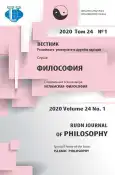Ethical-anthropological dilemmas of gamete and embryo donation: commodification, altruism, morality, and the future of the genetic family
- 作者: Kiyashchenko L.P.1, Bronfman S.A.2, Maylenova F.G.1
-
隶属关系:
- Institute of Philosophy RAS
- First Moscow State Medical University. THEM. Sechenov (Sechenov University)
- 期: 卷 24, 编号 1 (2020): ISLAMIC PHILOSOPHY
- 页面: 113-124
- 栏目: DISCUSSION PLATFORM
- URL: https://journal-vniispk.ru/2313-2302/article/view/325031
- DOI: https://doi.org/10.22363/2313-2302-2020-24-1-113-124
- ID: 325031
如何引用文章
全文:
详细
ART and, in particular, IVF and ICSI, are essentially a laboratory experiment, but which, due to its specificity, goes beyond the disciplinary boundaries, explicitly acquiring an ethical-axiological dimension in the interaction zone of the members of a particular community involved in child-bearing. At the same time, it is noted that the activity and choice of a way to solve problems with childbirth has a characteristic severity, due to the traditions and level of civil and social maturity of a country, due, among other things, to the level and achievements of technical equipment in this industry of knowledge and practice. According to foreign studies, about half of all subfertile people (having problems with childbirth, but potentially able to become parents) in developed countries are trying to overcome their infertility with the help of medicine, and research data indicate that the proportion of such individuals is growing. The most difficult problems of reproduction are associated with low quality of oocytes (eggs) or low ovarian reserve (both age and hereditary, as well as associated with past diseases or iatrogenic); aspermia and deep teratozoospermia (the presence of only pathological forms of sperm in the ejaculate), can not give hope to a couple (or individual) to have genetically related offspring. However, donor programs create additional opportunities for social (non-biological) motherhood / paternity. Donation of oocytes (ova) is found in ART programs at least 3 times more often than donation of spermatozoa (for heterosexual couples, but not for single women). At the moment, donation of gametes and embryos raises a number of ethical, legal, medical and socio-psychological issues that require competent support from experts of a wide range of specialists, as well as competent, non-commercial, primarily due to the interaction between donors and recipients. The analysis of possible modifications of family and kinship ties is based on the idea of transforming social relations, in which assisted reproductive technologies (ART) play a fundamental role, building a system of “new kinship and new family.” By entering into the intimate process of the birth of life and acting as a regulator of the composition of participants in this process through the stimulation of responsibility to present and future relatives, reproductive technologies affect the initial moral requirements in the community, redefining universal values based on the specific situation. Scenarios of childbearing through ART with the involvement of additional participants (donors of sperm, oocytes or embryos) are possible in the context of the legal field, but legally fixed anonymity of the donor (except for the relative of the recipient) leaves many unresolved issues related to the problems of hereditary diseases, genetic abnormalities and epigenetic changes; in addition, there is a problem associated with the possibility of unintentional incest, as well as the difficulties of the child’s self-identification and the closeness of his genealogy. Solutions to these issues are postponed until later, thereby initiating future dramatic situations, ethical conflicts and dilemmas with a poorly predictable positive outcome.
作者简介
Larisa Kiyashchenko
Institute of Philosophy RAS
编辑信件的主要联系方式.
Email: larisakiyashchenko@gmail.com
Doctor of Philosophy, Leading Researcher, Sector of Interdisciplinary Problems of Scientific and Technical Development
st. Goncharnaya, 12, p. 1, Moscow, Russian Federation, 109240Svetlana Bronfman
First Moscow State Medical University. THEM. Sechenov (Sechenov University)
Email: chernenko@mtu-net.ru
Candidate of Medical Sciences, Senior Researcher at the Laboratory for the Development and Implementation of New Non-Drug Therapeutic Methods of the Research Center
st. Trubetskaya, 8, Moscow, Russian Federation, 119048Farida Maylenova
Institute of Philosophy RAS
Email: farida.mailenova@mail.ru
Doctor of Philosophy, Leading Researcher in the Humanitarian Expertise and Bioethics Sector
st. Goncharnaya, 12, p. 1, Moscow, Russian Federation, 109240参考
- Gasparov AS, Nazarenko TA. Reproductive health. Infertility as a medical and social problem (clinical lecture). Moscow; 2000. (In Russ.)
- Isupova OG, Belyanin AV, Gusareva AA. VRT-modernity to help traditions. Demoscope Weekly.2014:615—616. URL: http: //demoscope.ru/weekly/2014/0615/tema01.php (appeal date: 04/12/2019). (In Russ.)
- Korsak VS. Expert opinion: why one should not be afraid of IVF (an interview for the “Vesti. Medicine” portal med.vesti.ru July 25, 188). (In Russ.)
- Popova OV. Man, his price and value: to the problem of body modification in scientific knowledge Epistemology and philosophy of science. 2016; 49 (3): 140—157. (In Russ.)
- Tishchenko PD. Bio-power in the era of biotechnology. Moscow; IFRAN, 2001.175s. (In Russ.)
- Strathern M. Displacing Knowledge: Technology and Consequences for Kinship // Conceiving the New World Order / ed. by G. Faye and R. Rappoport. Berkeley, Los Angeles, London: University of California Press, 1995. P. 346—363.
- Snowden R. et al., Artificial Reproduction. London: Allen and Unwin, 1983.
- Savvina OV. Childbearing: from previous taboos to human improvement technology. Moscow; URSS, 2018. (In Russ.)
- Yehuda R., Lehrner A. Intergenerational transmission of traumatic effects: the supposed role of epigenetic mechanisms World Psychiatry (Russian version). 2018; 17(3): 239— 253.
- Levi-Strauss K. Structural anthropology. Moscow; “Eksmo-press”, 2001. (In Russ.).
- Wirtz U. Murder of the Soul: Incest and Therapy. Moscow; “Kogito-center”, 2014. (In Russ.).
- Laplanche J, Pontalis WB. Dictionary of psychoanalysis. Moscow; “High School”, 1996. (In Russ.)
- Bereczkei T. et al. “Sexual imprinting in human mate choice”. Proceedings of the Royal Society B: Biological Sciences. 2004;271(1544):1129—1134. DOI: 10.1098/ rspb.2003.2672. PMC 1691703. PMID: 15306362.
- Morality and universality (collection of scientific articles) Ros. Acad. Sciences, Institute of Philosophy (under the editorship of RG Apresyan). Moscow; “Humanitarian”, 2018. Issue 1. P. 10. (In Russ.)
补充文件









